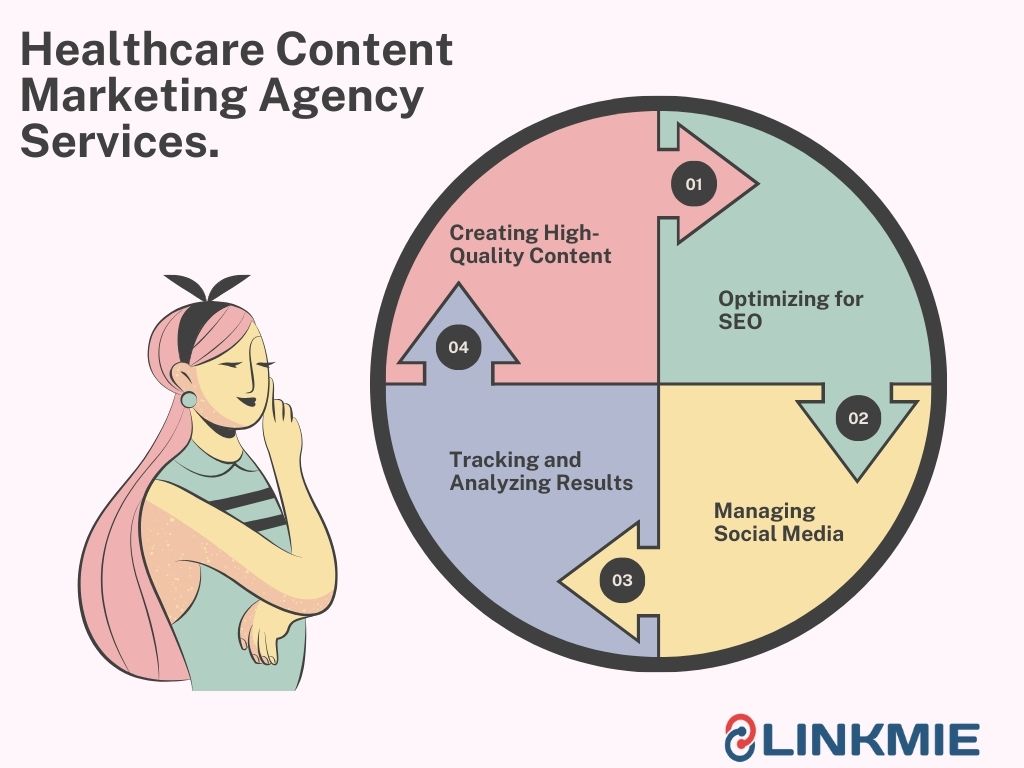Healthcare organizations can no longer rely on traditional methods to reach and inform their audience as many people now turn to search engines to find medical advice, learn about treatments, or look for nearby healthcare providers making the importance of healthcare content marketing grow significantly. This makes it essential for healthcare marketers to create content that’s both helpful and easy to find online.
Effective healthcare content marketing combines sharing accurate medical information with making sure it’s easy for search engines to display. By using smart SEO strategies, you can make your content trustworthy, useful, and visible to the people who need it most.
Key Points:
- Introduction: Healthcare organizations need to use SEO strategies to make sure their content is easy to find and helpful online. By combining accurate medical information with SEO, healthcare content can reach more people and build trust.
- Healthcare Content Marketing: This is about creating and sharing useful content to educate and connect with different groups like patients, caregivers, and healthcare professionals.
- Healthcare Content Marketing Agencies: These agencies focus on creating, improving, and sharing content for healthcare organizations. They help boost SEO, manage social media, and track how well content is performing.
- Healthcare Content Marketing Analysis: By looking at how people interact with content, SEO results, and overall performance, organizations can improve their content strategies. Key things to measure include how much people engage, where traffic comes from, and how many visitors take action.
- Benefits of Healthcare Content Marketing: Content marketing in healthcare helps build trust, improve visibility, attract leads, and keep patients by providing valuable, reliable information. It’s also a cost-effective strategy that offers a strong return on investment.
Healthcare Content Marketing.
Healthcare content marketing is all about creating and sharing helpful information to connect with people in the healthcare world. It’s used to educate and engage patients, caregivers, and healthcare professionals while building trust in a healthcare provider, organization, or brand.
The main idea is to give people the knowledge they need to make better decisions about their health or medical care, while also showcasing the expertise and services of the organization. Examples of this kind of content include blog posts, videos, infographics, newsletters, and social media posts about things like medical conditions, treatments, wellness tips, and ways to stay healthy.
For example, during a campaign I worked on for a family health center, we created blog posts addressing common childhood illnesses, preventive measures, and health tips for parents. Not only did this content build trust with the audience, but it also helped the organization rank higher for local searches on topics like “pediatric care” and “child health tips.” These are the kinds of connections that drive traffic and conversions.
Healthcare Content Marketing Agency.
One of the best decisions I made during my time at a healthcare marketing agency was to collaborate with content experts. Healthcare content marketing agencies specialize in crafting content that connects with patients while boosting SEO performance.
Their expertise can be invaluable, especially when working in a field as regulated and sensitive as healthcare.

Agencies provide services such as:
- Creating High-Quality Content: Writing blog posts, producing videos, and designing infographics that educate and engage.
- Optimizing for SEO: Ensuring that your content ranks well on search engines, making it easier for potential patients to find you.
- Managing Social Media: Promoting content and interacting with followers across platforms like Facebook, Twitter, and Instagram.
- Tracking and Analyzing Results: Measuring engagement, tracking website traffic, and adjusting strategies to improve performance.
Working with a healthcare content marketing agency helped streamline the digital marketing efforts of the organization I was working with. Their insights into SEO tactics and performance tracking were game-changers, allowing us to refine our strategies and continually improve.
Healthcare Content Marketing Agency Examples.
#1. Aha Media Group (Washington, D.C., USA):
Provides content strategy, copywriting, and SEO services to healthcare organizations, focusing on creating patient-centric content.
#2. Intrepy Healthcare Marketing (Atlanta, Georgia, USA):
Offers digital marketing services for medical practices, including SEO, website design, and social media management.
#3. OHO Interactive (Boston, Massachusetts, USA):
Specializes in content strategy, brand activation, and SEO audits for healthcare organizations.
#4.Healthcare Success (Irvine, California, USA):
Provides integrated marketing strategies, including content marketing, SEO, and reputation management for healthcare providers.
#5. The Spot On Agency (Chicago, Illinois, USA):
Focuses on B2B healthcare marketing, offering services like website optimization, content marketing, and ads management.
#6. Message Lab Media (New York, New York, USA):
Offers tailored content marketing solutions to engage audiences and elevate healthcare brands.
#7.Klick Health (Toronto, Ontario, Canada):
A global health marketing agency providing digital marketing and content creation services for healthcare brands.
#8. Healthware International (Salerno, Italy):
Specializes in healthcare communications, offering digital marketing and content strategy services.
SEO Strategies for Effective Healthcare Content Marketing.
#1. Understand Your Audience:
To make content people care about, you need to know who they are. Use surveys, check social media, and explore forums where they talk about health topics. Listen to their struggles, questions, and worries. Then, create content that answers their concerns and offers useful advice.
#2. Show You’re Trustworthy:
In health, trust is key. Use reliable sources like research papers, government health websites, or advice from real healthcare experts. Share your sources and include author details to show you’re credible. Keep old content updated so people know they can count on you for accurate information.
#3. Pick the Right Keywords:
Keywords tell you what people are searching for. Use tools like Google Keyword Planner or SEMrush to find specific phrases. For example, instead of “diabetes,” try something like “managing type 2 diabetes with diet.” This helps you attract the right audience and rank higher in search results.
#4. Use Local SEO for Nearby Audiences:
If your business serves a specific area, local SEO is essential. Add location-based phrases like “best dentist in Dallas” or “pediatrician near Los Angeles.” Update your Google My Business profile with your address, hours, and reviews. Being listed in local directories helps people nearby find you easily.
#5. Make Your Pages Search-Friendly:
Optimize your website to rank better on search engines. Write clear, catchy titles and meta descriptions using your keywords. Use headings (H1, H2, H3) to organize your content. Add descriptive text to images and ensure your site is accessible to everyone.
#6. Keep Content Simple and Clear:
Break down medical jargon into easy-to-understand language. Use visuals like charts, infographics, or videos to explain tricky ideas. For example, a simple chart showing how cholesterol affects the heart can make a big difference. Focus on teaching and helping your readers so they come back for more.
#7. Get Backlinks from Trusted Sources:
Links from reputable websites boost your credibility. Work with health bloggers, attend local events or write guest posts. For instance, contributing an article like “10 Signs You Should See a Doctor Immediately” to a popular blog can increase your visibility and trust.
#8. Be Mobile and Voice Search Ready:
Many people search on their phones or with voice assistants. Ensure your site works well on mobile and loads quickly. Use natural phrases like “How can I ease back pain?” to match the way people speak when using voice search.
#9. Measure Your Success:
Use tools like Google Analytics to see what’s working. Track traffic, bounce rates, and sign-ups. If a page like “weight loss tips” gets visitors but no sign-ups, try tweaking your call-to-action or improving the content.
#10. Stay Consistent and Adaptable:
The internet changes fast. Post fresh, helpful content regularly and stay on top of trends like Google updates or AI tools. Adjust your approach as needed to stay relevant and keep your audience interested.
Healthcare Content Marketing Analysis.
Healthcare content marketing analysis is all about understanding how well the content used by healthcare organizations connects with their audience and boosts their online visibility. This analysis helps healthcare providers, marketers, and digital strategists improve their content to engage patients, drive traffic to websites, and increase conversions.
Here’s a simple breakdown of the key parts of healthcare content marketing analysis:
#1. Audience Insights:
- Target audience: Knowing who is reading the content is essential. The audience may include patients, caregivers, healthcare professionals, or anyone interested in health and wellness.
- User behavior: Analyzing how users interact with content (e.g., time spent on pages, clicks, bounce rates) helps measure its effectiveness. Tools like Google Analytics show what topics your audience finds most interesting. Patients have unique needs, concerns, and preferences, and knowing these can make your content more helpful, engaging, and trustworthy. To help you identify and organize these insights, I’ve created a simple Patient Persona Template. This tool will guide you in defining who your ideal patients are, what they’re searching for, and how you can address their needs through your content.
#2. Content Performance Evaluation:
- Engagement metrics: Measuring likes, shares, comments, and other forms of interaction helps gauge how well content resonates with the audience.
- Traffic sources: Tracking where visitors come from—whether it’s organic search, social media, or paid ads—can improve content strategies and highlight areas needing better SEO or promotion.
- Conversion rates: Understanding how content leads to actions like appointments or newsletter sign-ups shows if your calls-to-action (CTAs) are working.
#3. SEO Effectiveness:
- Keyword rankings: Checking how well your content ranks for key healthcare keywords is vital. Tools like SEMrush or Ahrefs can show which keywords are performing well and where improvements are needed.
- On-page optimization: Ensure content is optimized for search engines, using keywords in titles, meta descriptions, headers, and image text.
- Backlink analysis: High-quality backlinks help improve search rankings. Analyzing how many and how strong your backlinks are can boost your SEO.
#4. Content Quality and Relevance:
- Accuracy and trustworthiness: Healthcare content must be accurate and reliable. It should reflect trusted sources like medical experts or research studies.
- Tone and clarity: The content should be clear and easy to understand for the audience, especially non-experts. It’s important that the tone matches the intended audience—whether compassionate, professional, or educational.
#5. Competitor Analysis:
- Benchmarking: Compare your content’s performance with others in the same healthcare niche. Look for areas where competitors may be doing better, like ranking for certain keywords or having higher engagement.
- Content gaps: Identify topics competitors aren’t covering but are important to your audience. Creating content on these gaps can attract more visitors.
#6. User Experience (UX) Evaluation:
- Website design and navigation: A smooth website experience keeps visitors engaged. Make sure the site is easy to navigate, mobile-friendly, and loads quickly.
- Accessibility: Your content should be accessible to everyone, including people with disabilities. Check if it’s compatible with screen readers, provides video captions, and meets accessibility standards.
#7. Social Media and Community Engagement:
- Social sharing and interaction: Track how often your content is shared on social media and how users are engaging with it. This provides feedback and helps understand audience needs.
- Building trust in communities: Trust is key in healthcare. See how your content is being received in health forums or patient support groups, and work to build that trust.
#8. Content ROI:
- Measuring return on investment (ROI): Compare the costs of producing, promoting, and distributing content with the revenue or leads it generates, such as new patient sign-ups or appointments.
#9. Content Distribution Channels:
- Distribution effectiveness: Identify which platforms are most effective for sharing healthcare content. Whether blog posts, newsletters, or social media, see which methods drive the most engagement.
- Email marketing performance: If you’re using email campaigns, check the open rates, click-through rates, and conversions to measure success.
#10. Long-Term Strategy:
- Content longevity: Assess if your content continues to attract traffic over time or if it fades quickly. Focus on creating content that remains relevant (evergreen content) for longer periods.
- Continuous optimization: Regularly review analytics to adjust your strategy. Healthcare content marketing needs to adapt to trends, audience needs, and search engine changes.
Benefits of Healthcare Content Marketing.
Effective healthcare content marketing offers several benefits that can help healthcare providers and organizations stand out and build trust with their audience. Here’s how it helps:
#1. Builds Trust:
By sharing accurate, well-researched, and helpful content, healthcare organizations can earn the trust of their audience. This is key in healthcare, where patients need reliable information about their health.
#2. Engages and Educates:
Healthcare content can answer common questions and address concerns, helping your audience make informed decisions. This leads to more engaged patients or customers who value your expertise.
#3. Improves Online Visibility:
Quality healthcare content, optimized for search engines, helps your website rank higher in search results, making it easier for potential patients to find you.
#4. Generates Leads:
Well-crafted calls to action (CTAs) in healthcare content can encourage potential patients to schedule appointments, sign up for newsletters, or ask about services, leading to more leads and conversions.
#5. Builds Authority:
Publishing quality content consistently can help healthcare providers become leaders in their field, increasing patient loyalty and attracting new business.
#6. Boosts Social Media Engagement:
Healthcare content can be shared on social media, expanding its reach. Posts like blog articles, infographics, and videos are easy to share, driving traffic back to your website.
#7. Cost-Effective Marketing:
Content marketing can be more affordable than traditional advertising. Over time, it can offer a better return on investment (ROI) for building brand awareness and attracting patients.
#8. Improves Patient Retention:
Content that offers ongoing value, such as health tips or updates on medical treatments, can keep patients engaged with your brand and improve long-term loyalty.
#9. Supports Reputation:
Positive, informative content helps shape your healthcare organization’s online reputation, addressing misinformation or negative reviews by offering accurate, helpful insights.
#10. Personalizes the Experience:
Tailoring content for different patient groups (based on age, health conditions, or demographics) allows you to create a more personalized experience, making patients feel understood and supported.
Conclusion.
Good SEO strategies are important for healthcare organizations to reach their target audience. Since many patients and caregivers look for healthcare information online, having a solid SEO plan helps healthcare brands appear in search results, making it easier for the right people to find them when they need it.
A key part of successful SEO is creating helpful, well-researched content. Healthcare organizations need to write high-quality content that answers their audience’s questions and needs while also following search engine best practices. This includes using the right keywords, providing accurate information, and ensuring the website is easy to use. Well-optimized content builds trust with patients because they know the information is reliable and useful for their health concerns.
It’s also important for healthcare brands to track their SEO performance regularly. They should monitor things like website traffic, engagement, and actions taken by visitors. By using this data, organizations can adjust their SEO strategies to stay in line with changing trends and audience needs.
In the end, combining great content with regular performance checks helps healthcare organizations improve their search engine rankings and build stronger relationships with their audience. This leads to more patient engagement, better brand visibility, and growth by attracting more patients and building long-term trust.
Frequently Asked Questions.
What is healthcare content marketing?
Healthcare content marketing is about creating and sharing helpful, accurate information to educate patients, caregivers, and healthcare professionals, while also promoting services and building trust.
Why is SEO important for healthcare content marketing?
SEO helps make sure your content shows up in search results when people look for healthcare information. This makes it easier for potential patients to find and trust your services.
What are some SEO strategies for healthcare marketing?
Some strategies include using the right keywords, focusing on local SEO, creating easy-to-find pages, getting backlinks, and making sure your content works well on mobile and with voice search.
How can healthcare content build trust?
By sharing accurate, well-researched content from trusted sources and keeping it updated, healthcare providers can become trusted experts in their field.
What is the role of healthcare content marketing agencies?
Healthcare content marketing agencies help create content, manage SEO, handle social media, and track how well campaigns are performing to make sure marketing efforts are successful.
Why is mobile optimization important for healthcare websites?
Since many people search for healthcare information on their phones, having a mobile-friendly website provides a better experience and can help your site rank higher in search results.
Related Articles.
- How to Integrate Content Marketing Automation into Your Existing Marketing Strategy
- How to Implement The 3 E’s of Content Marketing in Your Strategy
- What Does a Content Marketing Specialist Do? A Complete Guide






